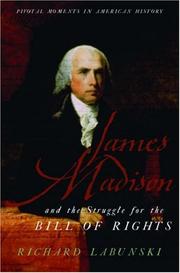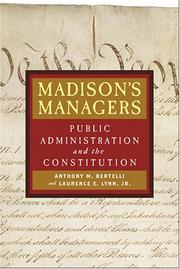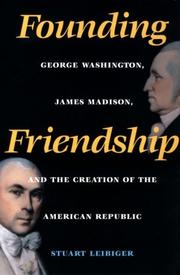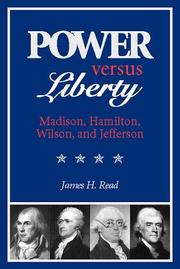| Listing 1 - 10 of 13 | << page >> |
Sort by
|

ISBN: 1282270729 9786612270727 1441627421 0198040016 9781441627421 0195181050 9780195181050 9780198040019 9781282270725 9780199740994 0199740992 6612270721 0197714048 Year: 2006 Publisher: Oxford ; New York : Oxford University Press,
Abstract | Keywords | Export | Availability | Bookmark
 Loading...
Loading...Choose an application
- Reference Manager
- EndNote
- RefWorks (Direct export to RefWorks)
Labunski presents the story of the ratification of the US Constitution, and how Founding Father, James Madison defied the Virginians who opposed the Constitution, to ensure that it, and the Bill of Rights, would bring the colonies together. This book aims to shed light on a key turning point in the nation's history.
Civil rights --- History. --- Madison, James, --- Helvidius, --- Mei-ti-sen, Chan-mu-shih, --- Mėdison, Dzheĭms, --- Madison, G., --- Madisŭn, Dzheĭms, --- United States. --- History
Book
ISBN: 0674495500 9780674089006 0674089006 9780674495500 9780674055278 0674055276 9780674979741 0674979745 Year: 2015 Publisher: Cambridge, MA
Abstract | Keywords | Export | Availability | Bookmark
 Loading...
Loading...Choose an application
- Reference Manager
- EndNote
- RefWorks (Direct export to RefWorks)
"New digital technologies and traditional historical investigation suggest that James Madison did not finish his famous Notes until after the Convention. The Notes are the most important, and most misunderstood, account of the 1787 Constitutional Convention. This biography of the Notes follows Madison as he created and then repeatedly revised a remarkable manuscript of American history. Originally a diary kept in part for the absent Thomas Jefferson, the Notes highlighted his fascination with the political strategy of drafting. But when the Convention began to draft the details of the Constitution, the complicated process led Madison to abandon his Notes. Only after serving in Congress and drafting new constitutional amendments did Madison return to complete them. By the time the Notes were published a half-century later, the layers of revisions made the Notes appear--inaccurately--to be an objective record of the writing of the Constitution"--
HISTORY / United States / Revolutionary Period (1775-1800). --- Madison, James, --- United States. --- Helvidius, --- Mei-ti-sen, Chan-mu-shih, --- Mėdison, Dzheĭms, --- Madison, G., --- Madisŭn, Dzheĭms,
Book
ISBN: 0739182188 9780739182185 9780739182178 073918217X Year: 2013 Publisher: Lanham
Abstract | Keywords | Export | Availability | Bookmark
 Loading...
Loading...Choose an application
- Reference Manager
- EndNote
- RefWorks (Direct export to RefWorks)
The foundation of the strong relationship between the trans-Appalachian West and the South was built in the last two decades of the eighteenth century when southerners, led by James Madison, defended the trans-Appalachian West and westerners against northerners' political and economic attacks. Over time many southerners came to believe that the South's political future depended on forging a tight political bond between the South and the trans-Appalachian West. While many historians have taken this close relationship for granted or dismissed it as a natural product of cultural simil
Sectionalism (United States) --- History --- Madison, James, --- Helvidius, --- Mei-ti-sen, Chan-mu-shih, --- Mėdison, Dzheĭms, --- Madison, G., --- Madisŭn, Dzheĭms, --- Political and social views. --- Southern States --- United States --- Northwest, Old --- Politics and government
Book
ISBN: 1469651025 1469651033 9781469651026 9781469651033 9781469651019 1469651017 9798890852243 Year: 2019 Publisher: Chapel Hill
Abstract | Keywords | Export | Availability | Bookmark
 Loading...
Loading...Choose an application
- Reference Manager
- EndNote
- RefWorks (Direct export to RefWorks)
Thomas Jefferson, author of the Declaration of Independence, and James Madison, 'Father of the Constitution,' were two of the most important Founders of the United States as well as the closest of political allies. Yet historians have often seen a tension between the idealistic rhetoric of the Declaration and the more pedestrian language of the Constitution. Moreover, to some, the adoption of the Constitution represented a repudiation of the democratic values of the Revolution. In this book, Jeff Broadwater explores the evolution of the constitutional thought of these two seminal American figures, from the beginning of the American Revolution through the adoption of the Bill of Rights.
Constitutional history --- Jefferson, Thomas, --- Madison, James, --- Helvidius, --- Mei-ti-sen, Chan-mu-shih, --- Mėdison, Dzheĭms, --- Madison, G., --- Madisŭn, Dzheĭms, --- Political and social views. --- United States.
Book
ISBN: 1469601877 0807869910 9780807869918 9781469601878 0807835307 9780807835302 9798893133806 Year: 2012 Publisher: Chapel Hill : University of North Carolina Press,
Abstract | Keywords | Export | Availability | Bookmark
 Loading...
Loading...Choose an application
- Reference Manager
- EndNote
- RefWorks (Direct export to RefWorks)
James Madison is remembered primarily as a systematic political theorist, but this bookish and unassuming man was also a practical politician who strove for balance in an age of revolution. In this biography, Jeff Broadwater focuses on Madison's role in the battle for religious freedom in Virginia, his contributions to the adoption of the Constitution and the Bill of Rights, his place in the evolution of the party system, his relationship with Dolley Madison, his performance as a wartime commander in chief, and his views on slavery. From Broadwater's perspective, no single figure can tell us m
Statesmen --- Presidents --- Madison, James, --- United States --- Politics and government --- Helvidius, --- Mei-ti-sen, Chan-mu-shih, --- Mėdison, Dzheĭms, --- Madison, G., --- Madisŭn, Dzheĭms, --- Madison, James --- Biography --- 1809-1817 --- 1789-1815

ISBN: 0801883199 0801882621 0801888786 9780801888786 9780801882623 9780801883194 Year: 2006 Publisher: Baltimore Johns Hopkins University Press
Abstract | Keywords | Export | Availability | Bookmark
 Loading...
Loading...Choose an application
- Reference Manager
- EndNote
- RefWorks (Direct export to RefWorks)
Madison's Managers challenges public management scholars and professionals to recognize that the legitimacy and future of public administration depend on its constitutional foundations and their specific implications for managerial practice.
Constitutional history -- United States. --- Madison, James, -- 1751-1836 -- Influence. --- Public administration -- United States. --- Separation of powers -- United States. --- Public administration --- Separation of powers --- Constitutional history --- Madison, James, --- Influence. --- Helvidius, --- Mei-ti-sen, Chan-mu-shih, --- Mėdison, Dzheĭms, --- Madison, G., --- Madisŭn, Dzheĭms,

ISBN: 1282273140 9786613815545 0813929121 0585120986 9780585120980 9780813929125 0813918820 9780813918822 Year: 1999 Publisher: Charlottesville University Press of Virginia
Abstract | Keywords | Export | Availability | Bookmark
 Loading...
Loading...Choose an application
- Reference Manager
- EndNote
- RefWorks (Direct export to RefWorks)
The development of their friendship, and eventual estrangement, mirrors in fascinating ways the political development of the early Republic.
Madison, James, --- Washington, George, --- Friends and associates. --- United States --- Politics and government --- Helvidius, --- Mei-ti-sen, Chan-mu-shih, --- Mėdison, Dzheĭms, --- Madison, G., --- Madisŭn, Dzheĭms, --- Vashington, Dzhordzh, --- Waszyngton, Jerzy, --- Washington, Georg, --- Uashingktoien, Geeorg, --- Uashingtʻn, Gēorg, --- װאשינגטאן, דזשארדזש, --- ジョージワシントン, --- Washington, G.
Book
ISBN: 1283604256 9786613916709 0813930472 9780813930473 9780813928111 0813928117 9781283604253 6613916706 Year: 2009 Publisher: Charlottesville University of Virginia Press
Abstract | Keywords | Export | Availability | Bookmark
 Loading...
Loading...Choose an application
- Reference Manager
- EndNote
- RefWorks (Direct export to RefWorks)
Presidents --- Madison, Dolley, --- Madison, James, --- Last years. --- Montpelier (Va. : Estate) --- Orange County (Va.) --- Orange Co., Va. --- Madison, Dolley Payne Todd, --- Payne, Dolley, --- Madison, Dolly, --- Helvidius, --- Mei-ti-sen, Chan-mu-shih, --- Mėdison, Dzheĭms, --- Madison, G., --- Madisŭn, Dzheĭms,

ISBN: 0817388494 0585098085 9780585098081 9780817308803 0817308806 0817308806 Year: 1997 Publisher: Tuscaloosa University of Alabama Press
Abstract | Keywords | Export | Availability | Bookmark
 Loading...
Loading...Choose an application
- Reference Manager
- EndNote
- RefWorks (Direct export to RefWorks)
This compelling narrative demonstrates the passionate interest the Jeffersonian presidents had in wresting land from less powerful foes and expanding Jefferson''s ""empire of liberty."" The first two decades of the 19th century found many Americans eager to move away from the crowded eastern seaboard and into new areas where their goals of landownership might be realized. Such movement was encouraged by Presidents Jefferson, Madison, and Monroe- collectively known as the Jeffersonians- who believed that the country''s destiny was to have total control over the entire North American continent.
Filibusters. --- Manifest Destiny. --- Political messianism --- Freebooters --- Adventure and adventurers --- Soldiers of fortune --- Monroe, James, --- Madison, James, --- Jefferson, Thomas, --- Helvidius, --- Mei-ti-sen, Chan-mu-shih, --- Mėdison, Dzheĭms, --- Madison, G., --- Madisŭn, Dzheĭms, --- Monro, Dzhems, --- Monroe, Jas. --- Texas --- Florida --- United States --- Gulf Coast (U.S.) --- History --- Territorial expansion. --- History. --- Annexations --- Territorial expansion --- Filibusters --- Spanish colony, 1784-1821 --- Jefferson, Thomas --- Madison, James --- 1810-1821 --- Manifest Destiny

ISBN: 1283875403 081392460X 9780813924601 0813919126 9780813919126 0813919118 9780813919119 0813919118 9780813919119 Year: 2000 Publisher: Charlottesville University Press of Virginia
Abstract | Keywords | Export | Availability | Bookmark
 Loading...
Loading...Choose an application
- Reference Manager
- EndNote
- RefWorks (Direct export to RefWorks)
Does every increase in the power of government entail a loss of liberty for the people? James H. Read examines how four key Founders--James Madison, Alexander Hamilton, James Wilson, and Thomas Jefferson--wrestled with this question during the first two decades of the American Republic. Power versus Liberty reconstructs a four-way conversation--sometimes respectful, sometimes shrill--that touched on the most important issues facing the new nation: the Constitution, the Bill of Rights, federal authority versus states' rights, freedom of the press, the controversial Bank of the United States, the relation between nationalism and democracy, and the elusive meaning of "the consent of the governed."Each of the men whose thought Read considers differed on these key questions. Jefferson believed that every increase in the power of government came at the expense of liberty: energetic governments, he insisted, are always oppressive. Madison believed that this view was too simple, that liberty can be threatened either by too much or too little governmental power. Hamilton and Wilson likewise rejected the Jeffersonian view of power and liberty but disagreed with Madison and with each other. The question of how to reconcile energetic government with the liberty of citizens is as timely today as it was in the first decades of the Republic. It pervades our political discourse and colors our readings of events from the confrontation at Waco to the Oklahoma City bombing to Congressional debate over how to spend the government surplus. While the rhetoric of both major political parties seems to posit a direct relationship between the size of our government and the scope of our political freedoms, the debates of Madison, Hamilton, Wilson, and Jefferson confound such simple dichotomies. As Read concludes, the relation between power and liberty is inherently complex.
Liberty. --- Authority. --- Power (Social sciences) --- Political science --- Civil liberty --- Emancipation --- Freedom --- Liberation --- Personal liberty --- Democracy --- Natural law --- Equality --- Libertarianism --- Social control --- Authoritarianism --- Consensus (Social sciences) --- Empowerment (Social sciences) --- Political power --- Exchange theory (Sociology) --- Social sciences --- Sociology --- History --- Jefferson, Thomas, --- Wilson, James, --- Hamilton, Alexander, --- Madison, James, --- Camillus, --- No Jacobin, --- Pacificus, --- Philo Camillus, --- Phocion, --- Han-mi-erh-teng, Ya-li-shan-ta, --- Gamilʹton, Aleksandr, --- Hamilton, Aleksander, --- Hamilton, A. --- Khamiltŭn, Aleksandŭr, --- Crassus, Lucius, --- Americanus, --- Helvidius, --- Mei-ti-sen, Chan-mu-shih, --- Mėdison, Dzheĭms, --- Madison, G., --- Madisŭn, Dzheĭms,
| Listing 1 - 10 of 13 | << page >> |
Sort by
|

 Search
Search Feedback
Feedback About UniCat
About UniCat  Help
Help News
News